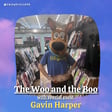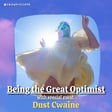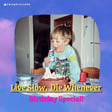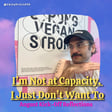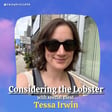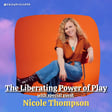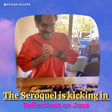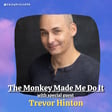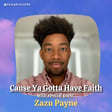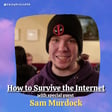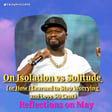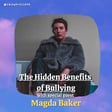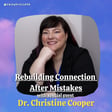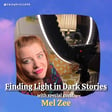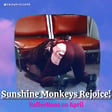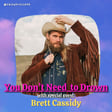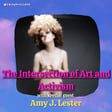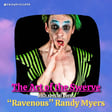Become a Creator today!Start creating today - Share your story with the world!
Start for free
00:00:00
00:00:01

Art at the End of the World with Corey Hardeman
This week on a very special episode of Friendless, your pal James unfriends painter Corey Hardeman. They discuss the cost of art, capitalism murdering creativity, and the Blood God that rules us all.
Check out Corey's work HERE
and follow her on Instagram
Be sure to sign up for the Friendless Substack
And follow Friendless on Instagram and on TikTok
If you're feeling spicy why not Buy Me A Coffee?
And then find all the other info and links you might need through the Friendless Linktree
Transcript
Introduction to 'Friendless' Podcast
00:00:08
Speaker
Well hey there sweet peas, welcome back friendless, the only podcast that tries to teach you how to be a better friend, well I lose every friend I have. I'm your pal James Avermenko, back once again with an incredible interview with the one, the only, Corey Hardiman.
Meet Corey Hardiman
00:00:24
Speaker
Corey is an incredible painter who I met back in my bargain bill days and I've been wanting to get her on the show forever, so I'm super excited to share this one.
00:00:31
Speaker
We talk all about the cost of art, capitalism, murdering creativity, and the unknowable blood god that rules us all. So lean back, get comfy, set your volume at a reasonable level, and enjoy my interview with Corey Hardiman here on Friendless.
00:00:47
Speaker
So welcome to the show. A dear friend from back in my Barkerville days, she's a painter. She is the owner of one of my favorite Instagram accounts on the internet. The one, the only Corey Hardiman. How are you today? Oh, I'm so happy to be here. It's such an honor. Thank you. It really is. Yeah, that's what I see here. You know, there's been, um, there's been some Barkerville alumni, you know, and, um,
00:01:14
Speaker
It's always really like, it's always such a joy to reconnect with that part of my life, you know, and, and it was, it was, you know, it was such an important couple summers and then I just lost touch with everyone. But I felt like the connections that were built there kind of like stood up against distance anyway, you know, and, and, and you're someone who like, I've always really cherished, like, you know,
00:01:39
Speaker
memory of you know not to pretend like either of us are you know gone or anything but it's like but it's different now we mostly see each other on the internet and not in real life so it is a different kind of relationship right yeah so i think where i want to start just for for for listeners who may not be familiar with your work i will put the question very bluntly um who the hell are you well i'm a painter uh i'm a sometimes death doula but mainly a painter uh i i make
Corey's Journey as a Painter
00:02:07
Speaker
oil paintings that I am fortunate to be able to live from the proceeds of. I've managed for the last decade or so to support myself and my family just making artwork, which is amazing. And I feel, well, I don't really feel any more, but I used to feel for a long time, I felt like I was getting away with something. It was all going to collapse at any moment.
00:02:32
Speaker
But it's been long enough now and I've had enough shows and my work is in enough places that it's, it's like a job. So I get up in the morning and I go to my studio and I paint. Yeah. You know, you, you are someone, I don't know if you'll remember this or not, but I remember there was, there was one time in that second summer when I was up in Brookerville working in the blacksmith shop and, and, um, we were driving back in the back, back of your truck in the, like, hay bales. That was exactly the memory that I thought of when I was reading the questions.
00:03:01
Speaker
And we were talking about art and being creative and I was still so young and I was still coming just out of school and I was so frustrated with myself because I wasn't writing the way I wanted to be writing.
00:03:19
Speaker
You said you have to suck at art for at least a decade before you can sort of make your first big breakthrough. And so you were like, just keep doing it. And don't worry about the output. Don't worry. And that changed my life, quite honestly. Oh my gosh, I'm so happy to hear that.
00:03:39
Speaker
yeah like don't be too hyperbolic like that like i i've held on to that my whole life you know oh i'm so glad i that really matters to me actually because i i really believe that and i'm glad to hear that i like that that hasn't changed for me over the last decade right like i really think that good work has to float on an ocean of shit you have to just make the work and it it doesn't like the work
00:04:05
Speaker
The work is what matters, like working at your art is what matters, not the product, it's the work.
00:04:12
Speaker
Yeah. So I bring that up because I want to dive into that sort of philosophy a little bit more with you.
Inspiration and Challenges in Art
00:04:19
Speaker
Because like you say, you've managed to create a genuine career out of this, which in most arts in Canada is next to impossible. And I'm really curious to sort of trace your path through that. And I think where I'd like to start by asking
00:04:40
Speaker
kind of rudimentary question is what sort of initiated this interest for you in painting and especially in oil painting? Like where did that first impulse come from?
00:04:52
Speaker
I think like, I mean, quite simply, I was born with it. It's, it's a really weird thing to say, but I don't remember a time when I didn't want to draw or paint or, or make work. Like I think of it as, it's like my most basic impulse. And, and the times in my life when I didn't like myself, it was a thing that I did that I liked and that I was good at. And that kind of kept me.
00:05:17
Speaker
kept me going, you know, when I was a crappy teenager and at other times. And I was actually quite resistant for a long time to doing it as a career, because I loved it so much. And I was worried that if I started to sell work, that it would become a regular job, which of course, it has to an extent, but that I would like, I would lose that that kind of private joy that I took in making work. And with oil painting,
00:05:46
Speaker
Well, paint is a really intimidating medium. And when I married my now ex-husband, I was actually very fortunate in that he had spent quite a lot of time oil painting. He's a really good painter. He doesn't paint anymore, which is kind of too bad. But he grew up in Holland and he spent a lot of time oil painting and he knew a lot about oil paint and he really pushed me to take that medium up.
00:06:09
Speaker
as soon as I gave myself over to it, it just captivated me. I was just enchanted by it. I've never strayed from that medium since I started, and I still find it so exciting. I learn so much from it all the time. It's like learning a language. It's so nuanced, and it does weird things because it's all natural pigments. They react to each other differently, and so you're always
00:06:35
Speaker
you're always kind of guessing at what's going to work. And then it does surprising things, which is exciting, right? Yeah, absolutely. Yeah, I mean, I have no formal training in it whatsoever, but I have recently in the last year or two started using oil painting as just like a sort of a therapeutic side thing. And with no intention of form, with no intention of like, you know, it's literally just like splotches. But I'm fully with you. There's something so magic about
00:07:04
Speaker
picking a color you like, putting it on the canvas, picking another color you like and like seeing what happens. Yeah. And sometimes you fuck up. Sometimes you're like all the time, you know, like all the time. Like I stand down so many paintings like.
00:07:18
Speaker
People are always like, oh, you knock it out of the park with every painting. And first of all, no. And secondly, I only post the ones I feel like I can live with. There's a million paintings in my studio that are faces to the wall to think about what they've done. They're a mess. And I will. I'll sand them down, or I'll paint over them, or I'll wait until I have a dream about them, and then I'll go back and change them. But yeah, there's always a mountain of garbage that you have to make all the time. And you learn stuff from it.
Adapting to New Learning Methods
00:07:48
Speaker
Yeah, did you take any formal training or is this purely like a self-taught you just like grew through the years?
00:07:54
Speaker
I mean, I grew through the years. I've been fortunate in that I've been mentored by some really great painters. Most recently, like at the beginning of COVID, a lot of painters that I've admired for like decades started putting on little online courses. And so at the beginning of COVID, I took a little, I think like a 10 day premier coup, which is like a, you know, making paintings, making the whole painting in a day, usually in a couple of hours.
00:08:19
Speaker
uh class with Dwayne Kaiser who's been my favorite painter since I was like 20 he's just a fan he's the he's the originator of the the daily painting movement in the states and he's like
00:08:31
Speaker
he was written up in the New York Times and he's he's like he's a big deal and so I took this little course with him and then he contacted me at the end and said so would you be interested in a mentorship because you he but he said to me that was so flattering was you remind me of me and I'd like to see what I might do
00:08:53
Speaker
So I spent a year talking to Dwayne Kaiser every week about painting and we still talk all the time. Like I was just talking to him earlier today. He's a delightful human being and a wonderful painter and he really pushed me in some directions that I don't know if I would have gone otherwise. Like he kind of demanded some things of me like big paintings and abstract paintings and things like that.
00:09:18
Speaker
I don't want to say I don't have the courage to do, but it's really easy to talk myself out of doing those big projects and to have, I didn't want to let them down, right? Which is really helpful, you need those people in your life, you don't want to let them down. And I have some, I mean the internet is wonderful for sort of peer mentorship for painters as well because
00:09:37
Speaker
I have access to a lot of people that I just wouldn't in my regular life. When I was living in Vancouver in my studio space you know I was surrounded by other artists who are serious artists and who work for a living like in the arts and that's just good energy to be around but also I have like I have a lot of
00:09:58
Speaker
people that follow my work and whose work I follow like a lot of mutual admiration from other painters that I that I really respect and when I run it you know up against my limitations or problems in a painting I can ask them I can say like what would you do in this situation or what do you think like what do you think about this piece and they'll they'll give me an honest crit and that is invaluable in in visual art like to have that is such a gift so
00:10:24
Speaker
I have that from them and they have it from me. And I think there's a certain tax you have to pay for the privilege of doing this kind of work because it is purely a privilege. And so when there are young painters that feel stuck or whatever, I try to spend time with them and look at their work critically and kindly as well. You run up against criticism all the time. And it's something you have to be very careful with because you can very easily
00:10:54
Speaker
Crush somebody, you know, yeah. So yeah, it's it's it's pretty great like at this point I you know, there's there's painters that I talked to regularly that I Just wouldn't be able to have access to in any other way and I'm so grateful for that
Corey's Unique Artistic Style
00:11:09
Speaker
I love that. I love that so much. It's funny, I feel like you kind of read my mind because I have a few questions down the line about communities and especially in painting and things like that. I want to put a little pin in those for now though. I want to come back to them because I had one more sort of building on question about your own sort of developed style that I'm really fascinated by because
00:11:32
Speaker
I don't know the proper lingo or language, but the vast majority of your art body is nature scenes or portraits of things in nature. What's so fascinating about them is that they will
00:11:51
Speaker
on sort of first blush, they'll look very naturalistic and very real. And then as you look at them, you realize that they're very often in very unnatural positions or they're framed very unnaturally. And I wonder if you could kind of expand a little bit more on that philosophy of those two like very oppositional images that come together.
00:12:11
Speaker
Yeah, I mean I think because my formal training is in, well not because my formal training is in biology, but you know my formal training is in biology and I think a lot about this moment in human history, like we're living in an extinction event, we're living in climate chaos.
00:12:27
Speaker
we're living in a time when we're seeing rapid and pretty horrifying, pretty stark changes in our immediate environment. And I think it's the duty of artists to respond to that, to the time that we're living in. And so when I'm painting a landscape, for example, there is certainly an element of painting the landscape itself, of painting what I see.
00:12:50
Speaker
But there's also, I never paint directly from photographs or I never, I take, I'll take a lot of photographs and I'll look at them. But when I go into the studio, what I'm really after is the feeling of the thing. It's not the thing itself. And so I do have
00:13:05
Speaker
I have a million nests in my studio that people have given me and I paint a lot of nests because I love them. They're so beautiful and they're so intricate. But I also think when I'm painting the nests, I think about the personality of the bird that built the nest. And I'm also thinking of the nest as an artifact. I'm thinking about things like
00:13:24
Speaker
um you know the massive die-off of insects and its impact on bird populations and thinking about like the loneliness of of a disused nest and unused nest is not a natural thing you know nests get recycled and reused um if not by the the sort of builder that the bird of origin by other animals and
00:13:43
Speaker
So to have this sort of profusion of empty nests in my studio, because I won't accept nests, like I won't let people take a nest out of a tree. I won't, like, I strongly discourage that, but people take trees down in their yards or they, you know, find a nest that's windblown or whatever, and they'll send it to me, which is beautiful and lovely. I have nests from all over. But I look at them and I think, like, is anything going to fill that space?
00:14:09
Speaker
You know, and that's that's a that's a hard question because I notice it. I just, you know, we just drove to Haida Gwaii and back and where there should be flocks of birds, there's one or two and where there should be, you know, just like a profusion of life. And there is in Haida Gwaii. And in a way, it's it's it. I think it's almost like a false hope, not a false hope. Hope isn't false, but like a
00:14:37
Speaker
There's something that's so, so exciting and so hopeful about going down to a beach and seeing birds you wouldn't normally see and seeing sea cucumbers and anemones just everywhere and you think, life is so resilient life is so profuse. And then you come back into the wildfire smoke and you realize like,
00:14:55
Speaker
It is those things, it's produced and resilient, but resiliency gets taken, it gets worn away and that's what we're doing, right? We're doing that with everything. We're reducing everything around us and we're robbing the world of its resiliency and that can't not make its way into my paintings. It just can't not. It can't just be beautiful. It has to be difficult as well because we live in a difficult time.
00:15:18
Speaker
Yeah. Oh God. You're just like you're making my heart just like swell. Like it's just you're like everything you're saying is just making my brain like brain just go into these million of directions. You know when you talk about the false hope but I love how you caveat it that there's no no hope is false. I love that. But I.
00:15:35
Speaker
I almost thought of something more akin to like, it's like a mirage or something like that. It's like, I often think about how when you're driving on those highways, you know, I think about being up in, in around Quinella and those kinds of areas, they've, um, you know, they've manicured the highways to only be able to see the forest. But if you go right over that hill, it's just clean cut, you know, right behind it.
00:15:55
Speaker
And so it's just little things like that. It's like a, it's like a mirage. It's a little fantasy that we all play together, you know? And, and, and we tell ourselves, no, it's okay. Cause if you go to the beach, you'll see a seagull. So that means there's life. And it's like, go just a little ways out of the harbor and right. And, and, um,
00:16:11
Speaker
Yeah, and I often get very paralyzed by that despair. I often get really overwhelmed by it. That's a very common reaction. I teach some workshops about climate grief to artists, and that is the common response. People get paralyzed and overwhelmed.
00:16:30
Speaker
And I do too. We do. It's natural too. And I think like for a lot of painters, especially in the sort of Eurocentric male white tradition, painting has been about monument making and it doesn't seem very sensible to make monuments at a time when the world is
00:16:49
Speaker
for all intents and purposes, ending in some important ways. And I sometimes say that to people when they ask, oh, is this archival, which of course it is, I'll say, you know, this oil paint is going to last for 500 years. It will outlast our species at the rate we're going. You don't have to worry too much. It's going to be OK. But, you know, and I don't like to be that dark all the time.
Balancing Art and Life
00:17:12
Speaker
You can't be. You have to be hopeful. You know, I have kids. I can't I can't just be like bleak all the time.
00:17:18
Speaker
But boy, you've got to know that shifting baseline is a thing. And even when we see the vast profusion of life in somewhere like Haida Gwaii or on Vancouver Island, it isn't what it used to be. It isn't what it used to be. Even standing in the coffee shop on Haida Gwaii, an Indigenous elder was talking to us and he was saying,
00:17:39
Speaker
you know, we were talking about how many gooey ducks and how many birds and how many anemones that were on the shore. And he said it's not like it was. It's not like it was at all. Yeah. And that's true everywhere. Yeah. Yeah. I am. I'm I have to I think one of the things I find so inspiring by you and your family is that you're so cognizant of of natural order and you're so cognizant of how, you know, animals work. And, you know, I still remember I still remember
00:18:07
Speaker
I think it was Elliot, I think, who once Googled, uh, giant beaver. But like, like your whole family has been so in touch and I always find that so inspiring. And I always, every time we talk, I learn these new things and
00:18:32
Speaker
The sort of where my perspective often comes in, where I sort of derive some hope from is that I'm very much a student of history and especially like of ancient history. And I find that really inspiring for two very different reasons. One being you can look at what's happened and you can see
00:18:48
Speaker
climate changing and you can see you know natural events and unnatural you know man-made events and how people shift and adapt and and they do go through dark periods but you know humanity as a as a collective pulls through the other side is like
00:19:06
Speaker
it's only like 2000 years and we barely know anything. So it's like legacy and monument and these thoughts of eternity are impossible for the human brain to comprehend. So it's sort of not worth worrying about because everyone will be forgotten. So you might as well just enjoy yourself and let what is be. It's really important I think to be humble in that way. Like sometimes I think
00:19:35
Speaker
You know, when things seem overwhelming, I think in a hundred years, everyone, like not only I, but everyone I have ever known, my own children, everyone will be dead.
00:19:45
Speaker
No one will remember this thing I'm screwing up right now. Exactly, right? Yeah, no matter what. No matter what happens. We're all gonna die. And that's as it should be. That's part of living. And without that, there's no, there's just, there's no meaning to any of it, right? Like you, you have to live your life. Like it's the only one you get and you have to
00:20:07
Speaker
take the chances that you need to take. And you have to fuck things up because you have to. You can't be a whole person if you're not willing to screw things up every so often. Yeah. Yeah. Yeah. Just blow it up and give it a shot. Right. Yeah, exactly. So scary, though. I talked to that. I talked to my therapist about that all the time. I'm always like, I want so much. And he's like, well, either either you want it, so go do it or you don't want it. And both are fine. But if you want it, then you are going to have to fuck other things up in order to get it.
00:20:37
Speaker
Yep, absolutely. And growth is just like really awkward and unpleasant. And like, yeah, like as a mother of an 18 year old girl, who is like amazing and wonderful. You know, she's, she's heading off on her own soon and, and she's worried and she's like, why do I feel so uncertain? And I said, because everything is uncertain. Like,
00:20:58
Speaker
and this stage of your life is just gonna be it's gonna sort of suck in some ways and in other ways it's gonna be liberating and freeing and you're gonna look back at it and go like oh i found out who i was but it doesn't feel good in the moment oh god no it feels like crap
00:21:13
Speaker
Yep, yep, right? Tell me about it. As two divorcees, I, you know, that's one that's like, oh shit, okay, now I have a completely new life that I have to form, right? Yeah, exactly. That's a fun one. Yep. I want to double back, though, on something, because you had talked about a couple of paintings that you are in contact with, and I wanted to ask a little bit more about that, because
00:21:38
Speaker
you
Community and Artistic Growth
00:21:39
Speaker
know painting like so many arts is an inherently very isolating form right it's a very personal expression like you know like writing that's how I always frame most of my thoughts is like writing is you're by yourself right and then it's only later that you get to bring people in and so I'm curious how you
00:21:58
Speaker
sort of maintain some semblance of community. And I know you did already kind of touch on it a little bit more, but I'm wondering if you can elaborate. And again, you have touched on this already, but I think a little bit more too is like, tell me about some of the living painters that inspire you. Yeah, I'm so fortunate that I know a lot of living painters that are really inspiring.
00:22:23
Speaker
I think that in terms of making the work, you're right. It is isolated. You've got to be alone with yourself and your relationship is with your work. It's immediate and your work demands your attention. It is so counterproductive to go on Instagram and look at the beautiful work of a million painters.
00:22:46
Speaker
Like it doesn't teach you anything. It doesn't tell you anything. It just makes you look at your own half-finished work and go like, where did I go wrong? And that's not helpful, right? It's not helpful because you don't see the process. You don't see how people got from nothing to something. And most of the painters that I admire and respect, they get from nothing to something by scraping things off a bunch of times and reworking things.
00:23:11
Speaker
So one of the forms that community has taken for me, it started in the pandemic and has really just lasted for the last few years. My friend Scott Connery, who's a really, really fantastic painter in the States, he's down in Oregon. He has done like a weekly or almost weekly
00:23:30
Speaker
sort of get together chat online so we just like a bunch of us get on zoom and we talk about our work and he he'll do like sometimes he'll do like a little painting demo sometimes he'll just like interview other artists that he knows and we'll just talk about stuff and it's the best it's so centering and it's so it's such a good reminder that everybody is struggling
00:23:52
Speaker
Everybody is struggling and art is hard and nobody finds it easy and nobody sees the same like I'm not going to make Scott's paintings. He's not going to make mine. Nobody else is making anybody else's art. The things that matter to other people.
00:24:08
Speaker
aren't necessarily the things that matter to me. I couldn't, you know, when I moved to Vancouver, I remember thinking like, oh my god, what am I going to paint? I'm certainly not going to become one of those rainy cityscape painters. And what I ended up doing was painting ditch water most of the time that I was there, right? Because
00:24:23
Speaker
Because it was it's the place where I could find the world it was the place where where I could find like salamanders and frogs and stuff and uh And like the reflection of the sky and and the things that you don't necessarily see in the city because i'm not interested in painting cars right like or any of the other things that kind of sell in vancouver and so um it's
00:24:47
Speaker
I think that the thing that you find out when you're when you're making work is you find out who you are and what you care about over and over and over again. You're just at the end of every painting you're confronted with yourself and it really helps to have other people who actually like you.
00:25:04
Speaker
around who are like, oh, hey, there you are, right? It's good for my ego, but it's also good for my process. It's good for me to remember that it's totally okay for me to be myself. It's okay for me to make work that reflects who I am and how I see the world and what I love and what I care about. And it's
00:25:26
Speaker
really good to also be able to see the people I like like I have met people and thought they were just fine nice people and then seeing their work and being like oh no I don't I don't like them I can't be there and then I've met people whose work has just moved me in ways
00:25:43
Speaker
that I couldn't have expected, I couldn't have anticipated that maybe I wouldn't have responded to them right away just like as an individual but having seen their work has shifted something has like changed my heart right and made me see them better and made me care about them and what happens to them and that's like a gift that we give to each other right like being able to see each other's work keeps us from being
00:26:08
Speaker
alone in the world. We get to see each other struggle and it's important that we not make perfect paintings. It's important that our paintings be flawed because we're flawed and our paintings are personal. They're not there to be perfect representations of something in the world. They're made to be parts of ourselves, parts of ourselves that are honest, not like parts of ourselves that are perfect. We're not perfect. Why would our work be?
00:26:36
Speaker
You're like I like I need you to just like give me a pep talk like I'm just feeling so like I I feel like I need to cut some of these like me being flabbergasted by you out of this because I'm just like I think it's gonna be forever answer but
00:26:54
Speaker
Like, um, one thought I was having as you were, as you were speaking, I was thinking about like, cause I love that reminder of your seeing the product, not the process. And, and I got thinking about like, what if we like, what if we, for every book published, you also published the first draft, you know? Oh yeah. Absolutely. Yeah. Yeah. Like, no, it doesn't show up. And, and there's such a, again, and it's so Eurocentric and it's so old man centered of like these.
00:27:23
Speaker
you know the the canon right you know our and and you can think of it in especially in painting too you think of you know Michelangelo and right you know and it's like these these they're not only not only are they perfect they're also holy right you know they're they're spiritual and it makes me almost sad
00:27:45
Speaker
for them in a way that like, yes, they were deeply skilled and obviously these are incredible works of art, but like, they're still like,
00:27:53
Speaker
almost a censorship involved by having to maintain a perfection and having to strive for that and they couldn't just be totally open and free and right and no I mean I'll tell you I went to so a few years ago I guess it was like six or seven years ago there was a Monet exhibition at the Vancouver Art Gallery and I went and I loved it so much and I loved it partly because
00:28:17
Speaker
It wasn't like a top tier exhibition. It had a lot of what I would call failed paintings.
Insights from Famous Artists' Works
00:28:23
Speaker
A lot of pieces that he did when he had cataracts and you could see his frustration and you could see that the work wasn't very good. It was not very good. You could see the struggle.
00:28:33
Speaker
and I loved it and I posted about it on Facebook and I got like flack for that for not thinking everything he did was a masterpiece but for me it humanized Monet and when I was looking at I've never been to Giverny I've never been to France I've never but I was looking at the photographs of his garden and I know a fair bit about his life because we all paint in his shadow right and I think that he was so constrained by
00:29:03
Speaker
Like if he had been here, if he had been somewhere truly where there's still wildness, like I can only imagine what he would have done, but he was so constrained by a garden and by the kind of setting that he was in and that he maintained, like he rigidly maintained that setting so he could paint it. And I think that that's his weakness. That's the weakness of Monet. Whereas I had, you know, another experience at the Vancouver Art Gallery a few years after that where
00:29:33
Speaker
um oh now i'm gonna forget his name oh my god what was his name david
00:29:43
Speaker
Anyway, an artist whose name I can't remember from the early part of the 19th century. David something. Yeah, David something. Good Lord. I can't believe I forgot. And this is menopause brain. It was like a retrospective, like it wasn't a retrospective, I guess, because he's he's dead. But it was a it was a show of like a lifetime of work of his and.
00:30:06
Speaker
you know he had been a war artist he had he had come back quite damaged from the war and he had moved to like rural north ontario where he just like starved in a little log cabin that he built himself and um
00:30:23
Speaker
I mean he didn't actually end up starving but he was super poor and you could see the the paintings where he'd gotten some money he'd sold a piece or someone had brought him some paint because all of a sudden there'd be this like exuberance of paint on the canvas and it was so exciting it was so moving I didn't expect to be moved by that I didn't like his work because I'd only seen color plates and then when I first walked into it I thought yeah
00:30:46
Speaker
okay and then i came around the corner and there was this boulder and i had to sit down and i went back to that show i had a membership at the at the vag and i went back i think seven or eight times just to look at that painting because it just it just knocked me sideways and i couldn't
00:31:01
Speaker
I couldn't look at it and tell you what it is about that painting that moved me so much. But I think about it every day. It was the most beautiful painting. And I like beautiful in this weird way, in this like weird, but deeply true way. And I think it's like a courageous painting. It doesn't make sense to me particularly. But I think about it all the time. I don't know. What is that?
00:31:29
Speaker
That's the ephemeral stuff that I'm always grasping at. I don't know what makes it good. It's not the composition. It's wrong. That to me is actually something that I'm hearing a lot of what you're saying that's really resonating with me and really reminded me of other thoughts I've been having about
00:31:50
Speaker
When an artist has an impulse, it's their duty to just follow the impulse. Yeah, absolutely. David Lynch always talks about that, where he's like, I'm just an artist. Yes, I make films. Yes, I paint. Yes, I this. Yes, I that. But it's just about I just follow an impulse, and it's my job to follow that impulse.
00:32:11
Speaker
It's not my job to decide if it's good or bad. It's just my job to follow the impulse. And that reminder, once again, to get out of your own way and just do the work and let somebody else decide if it speaks to them or not. Yeah, absolutely. Yeah, you can't let other people into your head.
00:32:29
Speaker
Like, I can go through a catalog of my paintings, I can pick out all the commissions, because as soon as I accept the commission, I'm like, that person's in my head, I can't see through my own eyes, I'm thinking about whether they'll like it, because I want to get paid, right?
00:32:44
Speaker
the work suffers like I have to I have to put commissions aside all the time and I have to give myself all these little rewards where I'm allowed to make whatever painting I want you know alongside the commission to keep me fresh so I can go back and forth because I don't want to let anything out of the studio that's substandard but I hate making commissions I really do and because like living as an artist in capitalism is a fear-based
00:33:08
Speaker
The way I live, it really is. I have a hard time saying no to things, but what that means is that people have to wait a long time for paintings, which, I mean, there are no art emergencies, but they do have to wait, you know? And I do feel bad about it sometimes. How do you find yourself? Milne, it was David Milne. David Milne, am I, N-E? N-E, yeah. I'm writing that down for the notes. Yeah, look for the boulder.
00:33:38
Speaker
How do you find yourself marrying those two concepts? Because that's something that I am every day growing deeper and deeper.
00:33:47
Speaker
in frustration with is this like, you know, cause capitalism to me has fundamentally murdered art, you know? And, and so, and yet it also demands more and more art, right? You know, like you think about the, you think about the pandemic and the, the need for more streaming content, the need for more entertainment and all these things. And yet now they are refusing to pay their artists, their writers. Yeah, it needs to be more and more and cheaper and cheaper.
00:34:13
Speaker
yeah and and you know it's why i like i really applaud you know like the the the writers union that's striking and i really applaud people who are who are fighting for it but it's like it's still frustrating because they did at the end of the day they're still fighting for money not necessarily for art and and even though i'm fully on board with them it's like
00:34:35
Speaker
We're still all collectively missing the point. Yeah. Like we got to take this system down and it does. It does murder art and it does murder. Like it literally kills painters. Like literally kills artists. Like people starve making work and there's no room to fail and people have to fail. If they want to be good at stuff, they have to fail and we don't let them.
00:34:56
Speaker
They either have to hold down a day job and work themselves to exhaustion and then fail in their own time. Who has time for that? I know people that are working three jobs or working two jobs and raising kids. It's insane. Or teaching art and putting all of their vision and all of their passion into teaching, which is valuable, important work, but it's got to come from somewhere. It leaves nothing for them.
00:35:24
Speaker
Yeah, no, it's a really difficult situation to be in. And because there's no security, because there's no pension, there's no benefits, there's no anything. I pay, you know, I pay $200 a month or something like that for benefits so that like my kids can go to the dentist. But it's, it's like, again, that's a privilege thing. Like I am privileged to be able to do that. And I'm lucky that I make work that people buy. But I've also had to finagle a lot
00:35:52
Speaker
So I divide my paintings into two categories. I make red paintings, which are the paintings I know that someone will buy. People will always buy bees. They'll always buy nests. They'll usually buy a landscape. They'll definitely buy anything I make that's tiny and cost $100. If I say like this painting is the size of a postcard, it costs $100. It took me, I mean, who knows how long to do. Sometimes a painting takes me 15 minutes. Oh my God. Why is that happening? Sorry.
00:36:21
Speaker
Oh my god. It happens to me all the time. Oh good. Yeah if if I'm making tiny paintings like they might take me 10 minutes it might take me two days it just depends what's going on that day.
00:36:36
Speaker
But somebody will definitely buy them. They never don't sell. Sometimes people compete for them. And that's great, right? That's great. But it means that I have to do that constantly. I have four kids. I have to do that all the time. I'm tied to my studio. Last summer when I had COVID, I thought, oh my god, what's going to happen? I don't know. What if I can't work? What if I get long COVID? I was really lucky that I didn't.
00:36:58
Speaker
But, you know, there's like paint is expensive, canvas is expensive, like space is expensive, everything is expensive. And when I first started out and I was like tying canvases to trees in the woods while we were living in a yurt, it was
00:37:15
Speaker
even that was expensive. Paint seemed like a luxury and I had to sell a certain number of paintings every year just to make it make sense. And so like marrying capitalism and painting, I don't. I hate capitalism, I'm a socialist, like I'm a pretty far left socialist, like I don't
00:37:34
Speaker
i don't like that i have to work in this system i really feel very strongly that i want to do exactly what i want to do without any impediment or any compromise for the rest of my life and i feel entitled to that and i know that that is something that like causes people some problems i know that people are like you're not entitled to that i've got to work a job i hate
00:37:56
Speaker
Well, you know, you shouldn't. Yeah, I think you should. I don't think you should. And I'm lucky that I don't have to work a job I hate. You know, I work really hard at this job I don't hate, but I don't hate it. I love it. I love it. And I want to do it for the rest of my life. And I
00:38:11
Speaker
I don't want to have to worry about whether or not I can pay the rent or feed my kids. I want to just do this thing because I think that it's a noble thing. I think that it makes the world better. I think it makes my relationships better. It makes me a better person. It makes the world a better place. It makes people happy. It makes them pay attention. It makes them love the world a little bit more. And I think that all of that is a net good. So I should be allowed to do that forever and nobody should fuck with it.
00:38:38
Speaker
It makes me so mad that I have to justify my existence as an artist or people will be like, oh, you're so lucky. Yes, I am. I am so lucky. I'm so lucky I was born white. I'm so lucky I was born in this country. I'm so lucky to be a cishet woman. That's all luck. And I am really, really glad. But I also feel like just basic human dignity demands that people should be allowed to make art and not punished for it.
Art's Role in Society and Capitalism
00:39:05
Speaker
Yes. No, I'm with you 100%. I mean, I would take that even further that it's like the housing insecurity that is imposed on everyone. Not a single person alive today asked to be born. And so the fact that our governments and the fact that our culture dictates that you are subservient to basic human needs
00:39:27
Speaker
like marketing basic needs like the fact that food is as expensive as it is like the fact that I can afford to buy food is great but it also means that I owe a debt I feel to innumerable people around me that can't who like who
00:39:44
Speaker
Who I care about like care about a lot of people and a lot of those people are not they're not making their bills or You know, they're they're just like in over their heads or their housing is so insecure That they don't know whether they'll have a place to live next month or they're homeless like they're unhoused I you know, I have my studio downtown in Vancouver and I had my studio downtown in prince george and that what that means is that you're part of a community of unhoused people and you see the way that
00:40:14
Speaker
Society generally treats people when they don't have a door that locks it changes Immediately into something even if people are are kind they are Sort of prescriptive and patriarchal and it's shitty
00:40:31
Speaker
like really shitty like that are the basic dignity basic needs are not met unless you are participating not just participating but like giving your life to this machine that grinds up human beings is disgusting
00:40:48
Speaker
Yeah, I see it as like, you know, I was reading recently about how the real heart of like post-World War One philosophy or just pre-actually, just pre-World War One, like Nietzsche and these kinds of writers, right? And the whole philosophy behind it was they were seeing
00:41:09
Speaker
You know, essentially they were seeing the removal of the spirit from the world, right? And so the whole concept behind God is dead wasn't just being like, it was like, we are now in a machine world and we no longer have connection to any sort of God whatsoever. Like the God of the earth is dead.
00:41:27
Speaker
And I often in my sort of like, you know, spectrum swirling thoughts, I often imagine that the real God of the earth is like a blood God and it demands sacrifice. And that's why like we got this sort of like uneasy peace for as long as we did because so many fucking people were killed over the last century.
00:41:49
Speaker
Um, and now it's getting hungry again, you know, and, uh, and that gets a little scary. Um, cause now we have to match that meal, you know? Um, but, uh, but that's also like, that's just, you know, that that's just like, uh, acid flashback thought, you know? I often think that there is though, I think that there is like, I'm not a religious person and I don't like that. Like, Oh, I'm spiritual, not religious thing. But I will say that I think that there is a force at the center of the world that is like,
00:42:18
Speaker
like not to be all Nietzsche, but beyond good and evil that is like, uh, that is hungry and loving and.
00:42:25
Speaker
and amoral and necessary and generative and also violent. Violent and mercurial and unreasoning. And I think when you engage with making any art, with making music or paintings or writing or anything, you're engaging with that force in all of its terror and all of its beauty. That's the job.
00:42:52
Speaker
And it's why, I mean, that's why like, cause every, you know, words are inherently lies, but it's like, it's humans trying to drive at that feeling. It's why they have words like the muse. It's why they have, you know, all these things, right? They're, they're, they're trying to give a word to something that's unnameable, but, but it's the best we can do with our little grunts, right? That's right. Exactly. Yeah.
00:43:13
Speaker
I want to I'm cognizant of the time and I wanted to just like I have my sort of my usual questions that we're gonna get to but I I want to ask first just just I wanted to dip my toes into it a little bit because you know
00:43:29
Speaker
As we mentioned, we met in Parkville and it's a really magic little community up there. And it's very clearly, I mean, I don't want to speak for you, but I feel like it's influenced the both of us and the directors are alive. And I'm wondering if you have any, like a story or something that you feel like sort of encapsulates or sort of demonstrates the spirit of that community that maybe or maybe not, I'm a part of. I don't know if there's a story that springs to mind for that.
00:43:58
Speaker
I mean, I certainly think about that story of being in like the back of the truck with the hay bales. That was that for me was that kind of being thrown together with people was such a such a weird gift at the time of my life and and such an important gift because you know they're at various points I've been really isolated and to have this sort of instant community where everyone was in it full time was
00:44:24
Speaker
was really wonderful and exciting and different and made me think differently and made me think differently about my relationships and differently about like what I wanted from my life. And then when my marriage collapsed a couple of years later, I went back. I moved back to Wells because it felt in a way, it felt safe. It felt like a womb, right? Like there are people that I love there. There were people that knew what had happened. There were people that like knew me
00:44:50
Speaker
and that had known me in that specific way and that were ready to like embrace me at a time when I was I really hadn't found my feet I didn't know what was going to happen and I didn't know um you know it was not a great breakup like it was scary and shitty and uh a lot was going on and I I just had this very very safe place that I could go for a while and I I
00:45:13
Speaker
you know wells has that same kind of feeling that we were talking about with high to quiet it's like a place apart in a funny way sparkleville has that too it's a place apart and time is different and your relationships are different and um you you just inhabit the world in a different way and i appreciate that about it i don't know that i could ever live there again uh but i
00:45:37
Speaker
I loved the time that I spent there, for sure. Yeah, I find myself haunted by it in the best sense of that word. Yeah, you still dream about it all the time? All the time. Me too, all the time. I have these strange moments at different seasons, especially like right around now, actually.
00:45:57
Speaker
like kind of the April into the July I have these moments where like the air kind of reminds me of it I get these little whiffs and I remember like going there for the first time and and just the like the the yeah the like mystery and the adventure and and the hauntedness like it's haunted it is like straight up haunted yeah well the only place in the world I've ever been where like grown
00:46:22
Speaker
you know, gold, like authentic modern day gold miner men would, would tell me that there were like fairies in the forest who liked to like play tricks on you and get you lost and stuff with like a complete straight authentic. Yeah, absolutely. I've heard more ghost stories from more like 60 year old men in that town. And they're like, not for entertainment. They're just like, this happened to me.
00:46:49
Speaker
yeah yeah and it's just yeah it's magic i find myself yeah like like very beautifully haunted by that town and i've always wanted to write about it but i've never i've yet to really find the inroad to it you know i'm going up on tuesday actually because my daughter is leaving and she wants to go visit before she leaves because she has
00:47:09
Speaker
you know her memories of it are from being a really little kid and we went back last year I think and she was like everything is so much smaller than I remember it because you know she had that that little kid perspective where everything seemed physically larger but also the world was wells like we used to take them to Vancouver and put them on the
00:47:27
Speaker
Like let them ride the escalators in the mall and that was like taking them to the carnival or something. They were so excited about it. So I remember, uh, I remember after my first summer there, but the first summer was the longer of the two summers. And I remember when I came back to Vancouver after that summer, I got vertigo on my first escalator. Whoa, what's a second story? What is this? Yeah. Yeah. Yeah. It's so weird. Yeah.
00:47:52
Speaker
And then put them with Jasper too. That makes me think of like, cause yeah, I remember her always like, you would, you would bring the little, the brood up and they would all just be like hanging off the rails. And you know, they were so little and so like, it was just their lives. They were always in the Creek behind the blacksmith shop and they were always like up to the Mason and daily. And it was just all of the summer we were there. Yeah. What a magic. I mean, it, it, that, that must be like a very.
Defining Friendship
00:48:16
Speaker
treasured memory for them. Yeah, I think so. I think I want to just I'm going to just jump to the like the last kind of big ethereal questions of the show. You know, it's something that you've really tapped into already. But
00:48:34
Speaker
You know, the heart of this podcast is unpacking what it means to be a friend, what it means to be in community, how to. I love that so much. It's such a great premise. I really appreciate that. And it's, you know, sometimes it's sort of dancing around it and sometimes I get more, more direct into it, you know, but I think.
00:48:49
Speaker
Everything we've talked about really paints the whole picture of what it means to be in community and connected and intimacy and all these things, you know, but, but it really does come down to the question that I'll, I'll post to you now, which is what does it mean to you to be a friend? Yeah, I've been thinking about this ever since I read the questions yesterday and I, it means different things at different times and with different people. Like I think there, there are certain categories of friends.
00:49:15
Speaker
Um, and the broad category of friends that I think I value the most in my life is comradeship. I really, I value people that have each other's backs, people that I know, people that I know will speak kindly about me when I'm not in the room and about whom I will speak kindly when they're not in the room and who I will defend in a Facebook argument and trust to do the same with me. Um, and I mean,
00:49:44
Speaker
I don't think I have a lot of friends that are not on, we're not on the same path. We're not all artists. We're not all, you know, after the same things in life.
00:49:54
Speaker
I have friendships with tremendous longevity that I value so much with really disparate people, but people that I've known since I was a little kid that through many moves and periods of silence and distance and all kinds of things have just remained steadfast. So I think steadfastness is a very big deal to me. And I try to be steadfast for others. And I also really,
00:50:22
Speaker
To be a friend, I think, is to be trustworthy and to be honest in ways that are kind. So, you know, we have to gauge one another's state and be compassionate and not, like, when I think about friendship, I think about the people that I trust to criticize me, to criticize my work, but I also trust them to wait for me to ask for their criticism.
00:50:51
Speaker
And that's, I think that's like a sacred contract. And there are a few people I trust with that. I have a very like dear friend who is a writer, a wonderful writer, Jill Wigmore. And she is one of like, we have a standing coffee date every Wednesday and it's non-negotiable. I mean, it's negotiable in that we can, we can take time off and go other places. Like I missed the last two Wednesdays because I was away, but the friendship is non-negotiable and the substance of the friendship is how
00:51:21
Speaker
how we make art, but also how we like walk this path of being women who make art in a world and in a town that is very, very patriarchal and fairly dismissive of the arts overall. And it's vital to me. That friendship, it fills a very specific role in my life and it is like,
00:51:48
Speaker
it is forever because of that. Like it, I, I need that friendship. She needs that friendship and we both get so much out of it. But there, there are so many different kinds of friendships and so many different ways to be friends. So I think the guiding principle for me is like, it's love and it's, but it's also respect. Like I've had people that I love very much and that love me very much. I have no doubt about it, but friendship off because there, there have been,
00:52:18
Speaker
just ways that either maybe I haven't respected their boundaries, but certainly they haven't respected mine. And, um, and I've had to terminate a couple of friendships for those reasons, because I don't have the time to say the same things over and over again. And I don't like being constantly tested. I don't like people that need, um, you know, they need, they need to text several times a day and they need a response or they worry and they become insecure. I want people to trust me that I have their back and I want
00:52:49
Speaker
to be able to trust them the same way and I don't want to have to talk about it all the time like it's super important to me that because I am an introvert and it matters to me that if I'm in my studio my phone's not going buzz buzz buzz buzz buzz I can turn off my notifications and nobody's feelings get hurt and if I'm in there for 17 hours nobody's feelings get hurt because for me that's the emergency like being out there and being able to work is
00:53:14
Speaker
That's an emergency for me. If I can't do that, everything hinges on it. So they need to respect that. And I respect their processes too. I would never walk into a writer's living room and say, well, I'm here. Now it's time for me. So I think the space, I think the willingness and the ability to navigate space around one another lovingly is a huge part of friendship.
00:53:39
Speaker
Oh, I love that so much. I love that. Yeah, I want to take some of that stuff to heart. The follow up is, you know, I always try to give the listeners at the very end, like a little actionable thing they can try. And so what do you think is their, whoa, sorry, my brain tripped over itself there. What do you think is one thing listeners could try doing this week to be a better friend to someone in their community?
00:54:10
Speaker
Like as a woman on the internet, like I spent a lot of time on the internet, less than I used to, but I would say, especially if you're a dude, if you see a woman or like a non-binary friend or anybody that is not like a cis white dude who is having an argument on the internet somewhere about like their basic right to exist in public,
00:54:37
Speaker
Go get their back. Go stick up for them. Go talk to your friends and tell them to smarten up. For me, that's a love language. People sticking up for other people, it's super important. And I've had the situation where I've been in arguments online with men who I've asked for help from my male friends, and they've said, oh, but you're doing fine.
00:55:03
Speaker
help people when they need help you should help people i think that like that's an actionable thing if you see somebody that needs help you should try to help them yeah oh i love that so much cori i just i you know it's it's crazy to think that this is like this is the first time we've like talked talked in like god knows how long like a decade yeah i was gonna say at a minimum 10 years yeah which is like not okay you know but uh
00:55:27
Speaker
But, you know, on the very, very off chance and the horrific thought that I don't speak to you for another 10 years like this, I just, you know, I really want to say, like, I just, I'm so inspired by you. And I think that you're just such an incredible spirit and just presence on this earth. And I'm so grateful that I got to cross paths with you when I did in my life. And I want you to know just how much you have
00:55:52
Speaker
um influence the trajectory of my whole life and oh that's such a good thing to say to me thank you so much it really is i'll try not to become like an egomaniac as a result but it means
00:56:03
Speaker
It means a lot to me. Like that, that, that really matters to me. And I think of you, you know, regularly and so fondly and not just of that time in Barkerville, but just like, you know, when you started the friendless podcast and it kind of blew up a bit, I was so proud of you. And I'm so, I'm just so jazzed to be on it. It's really, really nice. Right. And I'm, I'm, I love these questions. I love getting to think about this stuff a lot. It's so, it's good for me. It helps me. And it just like, it helps to remind me of
00:56:33
Speaker
of why I'm so happy. Yeah. And I really am like the world is ending and I'm super happy. And this this is really, really good. I'm sorry. My stupid notifications are loud. All good. All good. Yeah. No, it's yeah. And that's that's it's really nice to see you happy. I think that's one of the other things that it's like it's so nice to see you and see you smiling and see you like and it's like an authentic thing. You know, I'm super happy. It's ridiculous. Sometimes I like the world is literally burning and I'm like,
00:57:03
Speaker
Does it make sense that as things get worse out there, they get better for me personally? We gotta be happy though. We're gonna die either way, so we might as well be happy, you know? Yep, absolutely. If you can, you should. Not everybody can, and certainly not all the time, so if you can, you should. I got one last thing I gotta do before we wrap up this, but here we go. Cory Hardiman, we are longer Facebook friends.
00:57:33
Speaker
It's okay. I'll see you on Instagram. I will connect you with some of my favorite artists.
00:57:39
Speaker
Oh my god, I would love that so much. Come be in my community. Yes, please. You can't escape me just by unfriending me. Yes, I need that actually though. Please help me. Okay, I will. For sure. I'll send you a list on Instagram. Before we hang up, I just want to ask, is there somewhere you would like listeners to find you? Are there specific links or accounts or anything like that? Yeah, they can find me on my Facebook account at Cory Hardiman Painter.
00:58:06
Speaker
of Facebook. I'm on Instagram at CJ Hardiman. And I have a website, which is Coryhardiman.ca. Okay, well, I will make sure I write for a couple of publications as well. I write for Galaxy Brain, which is a sort of an arts literary publication out of Toronto. And I write for Thimbleberry, which is a literary publication up here in Prince George at UBC.
00:58:30
Speaker
incredible i will i'll i'll get all those links together and those are all going to be in the show notes so listeners go check it out cori i just yeah once more i just i love you so much and i think i love you too buddy thank you so much yeah thank you i'm just i love that we got to do this it was so fun so good to see you too yes
00:59:05
Speaker
And that's it. Thank you again to Quarry for joining me this week. I think she's just one in a billion and I feel so blessed to have her in my life in any capacity. Please check out her work through the links that I've provided in the show notes. And if you like the show, please be sure to give it a five-star review. Wherever you listen, reviews are so helpful to building awareness of the show.
00:59:25
Speaker
and they're free. Friendless has actually been nominated for a couple podcast awards. I am nominated for the Society and Culture Award as well as People's Choice Award. And if you would do me the great favor of creating an account on the website and voting at least in those categories, it would mean the absolute world to me. The links are in the show notes. And if you want even more Friendless content, please be sure to sign up for the monthly sub stack.
00:59:53
Speaker
You're gonna get recommendations for books, music, movies, podcasts, and all kinds of other fun stuff. You're also gonna get a new writing prompt with every newsletter to try out for yourself, along with helpful tips on how to be a better friend to yourself and your community. I'm slowly trying to build up the content there, and I'm really proud of this month's newsletter, which should have either just published as of this episode going live or is about to.
01:00:17
Speaker
On top of that, I have, along with what feels like the whole rest of the world, joined threads. Admittedly, I feel just as lost on that app as I did on Twitter, but I'm giving it my best, so give me a follow. As always, all those links are in the show notes. But that's it for me, so let's wrap this little puppy up. Thank you so much for listening through the end. I will be back next week with a brand new episode that I think you're gonna love, and I hope you'll join me then.
01:00:40
Speaker
But I'm not going to worry about that now and neither should you because that is then and this is now. So for now, I'll just say I love you and I wish you well. Fun and safety sweeties.
01:01:11
Speaker
you

